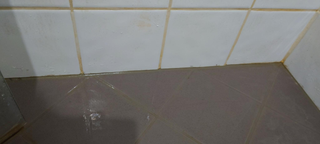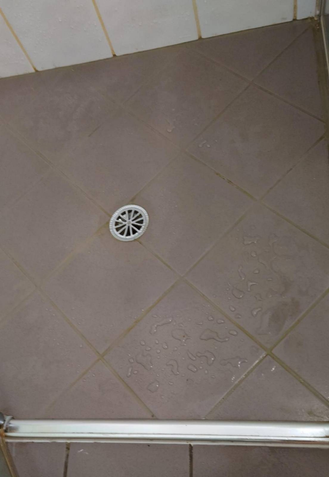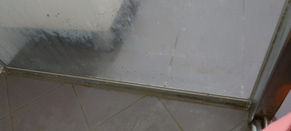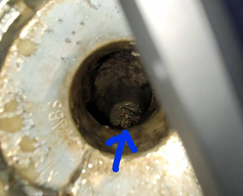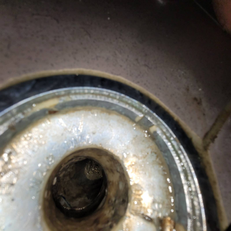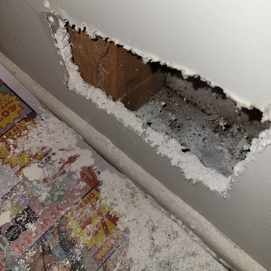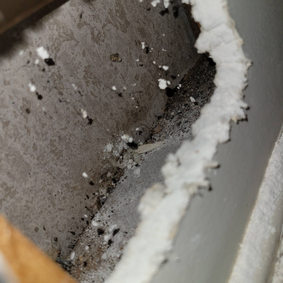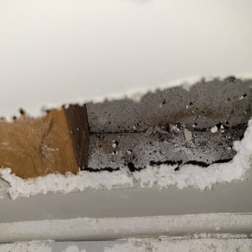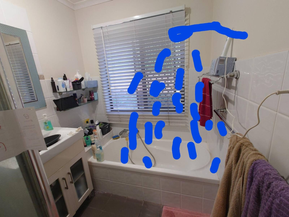The Bunnings Workshop community can help with your home improvement projects.
- Bunnings Workshop
- >
- Discussion
- >
- Bathroom and Laundry
- >
- After some great waterproofing products ...
After some great waterproofing products for special use
- Subscribe to RSS Feed
- Mark Topic as New
- Mark Topic as Read
- Float this Topic for Current User
- Bookmark
- Subscribe
- Mute
- Printer Friendly Page
- Mark as New
- Bookmark
- Subscribe
- Mute
- Subscribe to RSS Feed
- Highlight
- Report Inappropriate Content
After some great waterproofing products for special use
About eleven months ago, we hired a shower repair company to seal the tile floor of our shower stall with epoxy grout.
But now it is leaking again. We are contacting the company for a re-seal but not sure if they will honour the warranty.
Now we have two possible causes:
1) Leaking shower faucet behind the wall (but the plumber already "leaked test" the faucet last year, they found one and fixed the source of leak behind the wall)
2) Tiles moved and created hairline crack
If the company is not willing to reseal our shower, we are thinking to install an acrylic shower pan/base.
To us , It seems much better and simple but effective to have a piece of smooth, slick and solid pan / shower base, than replying on some sticky epoxy grout tiles to "seal all the gaps" between tiles ... is it a better choice?
Currently renting another property and the toilet has a big plastic shower base, preventing all the water from seeping through the tiles. Seems a no-brainer? and easy to install as well?
________________________________________________________________________________
If we go for shower base, it will probably take us several weeks to plan this.. (ask around to get recommendation for good local plumber or handyman, arranging onsite quote when we're home on weekend, comparing quotes, or try to learn about the feasibility of DIY)
Several weeks of planning, would mean we need something to fix the leaking problem first
We are thinking to get some thick , gluey, sticky, durable waterproofing gel to "paint on all tiles" directly, instead of regrouting.
Creating a thick layer Above the tile floor, sealing off all cracks and gap. Appearance wont be an issue since we will install a base on it in future.
Liquid waterproofing product wont be good and durable enough.
________________________________________________________________________________
Could anyone share your thought on Shower pan/base vs Tile floor,
and what product you recommend to paint directly on those tiles?
Many thanks.. for any comment. Still have a lot to learn..!
- Mark as New
- Bookmark
- Subscribe
- Mute
- Subscribe to RSS Feed
- Highlight
- Report Inappropriate Content
Re: After some great waterproofing products for special use
Impossible to tell from your photo but you could have multiple possible sources of water leaking - behind shower rose and/or tap penetrations, failed silicone at wall-to-wall or wall-to-floor junctions, failed grout, insufficient or failed waterproof membrane at your waste (a puddle flange should be installed under your waste).
Acrylic or polymarble bases are pretty leakproof if installed correctly. As a minimum, you should;
- Remove all tiles and probably plasterboard behind
- Remove floor tiles.
- Repair any damaged timber and flooring.
- Install new timber in walls to support new plasterboard.
- Check out timber studs to rebate the shower base as per manufacturer instructions.
- Install shower base.
- Install new plasterboard - tape and plaster joins, caulk only (no plaster compound) at wall-to-wall joins and at wall to shower base join.
- Waterproof walls with bond breaker at wall-to-wall joins
- Tile and grout.
- Reinstate shower screen.
There is no product that can produce a 10mm thick layer of waterproof gel...even if there was I can't think of a way that you'd be able to successfully terminate it to a waste without water running back underneath.
- Mark as New
- Bookmark
- Subscribe
- Mute
- Subscribe to RSS Feed
- Highlight
- Report Inappropriate Content
Re: After some great waterproofing products for special use
Hello @Vis-á-vis
Thank you so much for the detailed recommendation. Let me tag @ivanptr to make them aware of your suggestions. I totally agree with using acrylic or polymarble bases as it removes the guesswork from your build. If they combine it with an acrylic wall liner it will save them so much work as tiling will no longer be necessary.
Eric
- Mark as New
- Bookmark
- Subscribe
- Mute
- Subscribe to RSS Feed
- Highlight
- Report Inappropriate Content
Re: After some great waterproofing products for special use
Thanks a lot for all the thought @Vis-á-vis
How can we know if this is due to the failed waterproof membrane at your waste (a puddle flange should be installed under your waste) ? Do you think plumbers can know this by visual inspection? Or they need to use camera for this ?
Last time when we approached plumbers for leaky shower inspection, some just asked us to get help from waterprooferw. But sometimes, the waterproofer asked us to find plumbers..
Is the puddle flange under the waste usually inspected and repaired by plumbers?
- Mark as New
- Bookmark
- Subscribe
- Mute
- Subscribe to RSS Feed
- Highlight
- Report Inappropriate Content
Re: After some great waterproofing products for special use
Hi @EricL , thanks for the +ve confirmation, then we will definitely do acrylic or polymarble bases.
But now we will try to identify the cause :
First , we will pour a bucket of water to the shower floor (not using the tap) to see if the carpet get wet and it is caused by the defective tile floor.
Second, we will turn on the shower tap filling a bucket, not letting the shower floor get wet. If the carpet is getting wetter , then it can be the tap issue.
What if the leak issue is from the tile floor crack and not from the tap, is there any durable waterproofing epoxy grout from Bunnings that we can use and directly apply them over tiles ?
We will need a temporary fix so we can avoid planning the install of shower bases in a rush.
Any good epoxy waterproofing grout?
- Mark as New
- Bookmark
- Subscribe
- Mute
- Subscribe to RSS Feed
- Highlight
- Report Inappropriate Content
Re: After some great waterproofing products for special use
Can we apply this on top of the current epoxy grout ? :
- Mark as New
- Bookmark
- Subscribe
- Mute
- Subscribe to RSS Feed
- Highlight
- Report Inappropriate Content
Re: After some great waterproofing products for special use
Hi @ivanptr,
I'd suggest you do a visual check of all grout joints between tiles whilst paying particular attention to where the walls meet the floor. Please let us know if you find any cracks and take some pictures. If the silicone/grout around the perimeter of the shower base is degraded, I'd recommend removing it and re-applying a bathroom silicone to those joints. After any repair work is dry, you can paint over the entire shower base and up the walls slightly with Shower Plug. Shower plug is good at covering hairline cracks, and the product will provide a layer that should assist with any water seeping out from between tiles. This is a band-aid solution that could help until you are ready to commit to further work.
The sika product you've linked to is for new installations. I can't see applying it over existing grout doing anything but causing a mess. I'd believe you'd be better off using a bathroom silicone.
Could you provide more detail on this carpet that is getting wet? Is it on the other side of a wall to the shower/taps/shower rose? If so, the first thing I'd be doing is cutting a section of plasterboard away directly above the wet carpet. You can then inspect the timber work, which will likely help you determine where the water is coming from. If there is water dripping/seeping down from above, it could be the taps/shower rose, and if it's only at floor level, seeping out of the shower pan area, then it's likely a failed membrane.
Mitchell
- Mark as New
- Bookmark
- Subscribe
- Mute
- Subscribe to RSS Feed
- Highlight
- Report Inappropriate Content
Re: After some great waterproofing products for special use
Hi @MitchellMc and @Vis-á-vis ,
We have inspected visually and found no cracks -
Floor to wall junction - couldnt find any crack, seems it is sealed with hard epoxy instead of silicone, as when we use fingers to poke at it, it feels solid and not elastic.
Wall to frame junction - degraded with some mould on it (frame on the right):
Floor Grout - seems okay with no crack visually
Grout under the steel frame - this is where we cant inspect, but the grout might be degraded with black mould due to high humidity in the bathroom.
Wastepipe - seems it is minorly clogged but not sure the "a puddle flange, the waterproof membrane" at the waste is failed
Carpet location, shown by this clip :
https://youtube.com/shorts/NBbaVvcHD-c?feature=share
2 sections (of the plasterboard) on the hallway wall were cut away by the plumber fixing the leaky pipe last year when we moved in. We kept them open in case it leaks again
And then you will see a section of plasterboard directly above the wet carpet were cut by us yesterday:
My family used dehumidifier for a whole night in the room before I cut the plaster board, not easy for me to find any moisture / water behind the board. But I guess I will keep observing this hole after I keep pouring buckets of water to the shower floor.
Other questions we have:
If the floor grout seems fine and doesn't need to be replaced , perhaps we can apply Shower Plug on the floor first to make sure those any super thin crack that we cant see are sealed?
Since we have a bathtub and it is working fine with no leaking trouble like the shower stall does, we are considering to ask plumber to install a shower over bath first, until we have time to plan for the shower stall renovation, is this idea feasible and good?
What do we need to be aware of when asking the plumber for this kind of conversion? (Bath -> Shower over bath)
Many thanks for any ideas and advice.
- Mark as New
- Bookmark
- Subscribe
- Mute
- Subscribe to RSS Feed
- Highlight
- Report Inappropriate Content
Re: After some great waterproofing products for special use
If you have water outside of your shower in your carpet then you have a leak somewhere. As previously mentioned it could be any number of issues and the remedy is to rip it all out and start again.
Installing a shower over your bath. I'm not sure what "planning" you need to do but you are spending a lot of time investigating and planning other solutions that could be used to address the issue.
Putting a shower over your bath at the opposite end to where the current plumbing is, taking down the wall, waterproofing, installing a screen etc. will be expensive. Plus, you will have a window effectively in your shower which will collect water in the frame.... it is nearly as bad an idea as having a live electrical appliance on a shelf above your bath.
- Mark as New
- Bookmark
- Subscribe
- Mute
- Subscribe to RSS Feed
- Highlight
- Report Inappropriate Content
Re: After some great waterproofing products for special use
If you can't see any visual cracks in the tile grout, then Showerplug will not resolve the issue. Having a saturated carpet means a significant amount of water is coming from somewhere. This could be a pipe leak, or the membrane has failed. This might be a silly question, but has anyone recently replaced taps or tap washers in the shower? I once encountered a similar situation where someone had forgotten to replace the spindle washer, and the carpet on the opposite side of the wall was getting saturated. A plumber, painter and builder had all missed/couldn't diagnose the issue. I went out to the property to assist the elderly customer because he was desperate. It took all of five minutes to work out where the water was coming from.
Is the carpet damp at all directly behind where the vanity is? Given the water connections there and not being too far away, that could be another possible leak location.
Mitchell
Why join the Bunnings Workshop community?
Workshop is a friendly place to learn, get ideas and find inspiration for your home improvement projects
You might also like
We would love to help with your project.
Join the Bunnings Workshop community today to ask questions and get advice.


